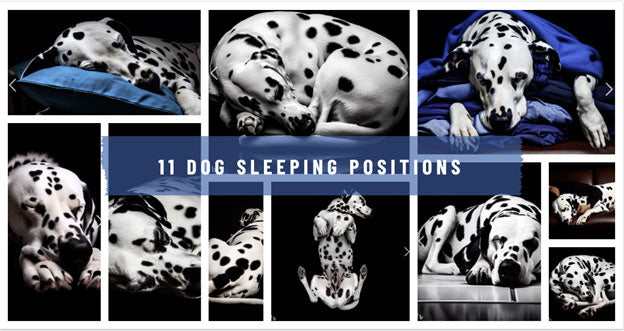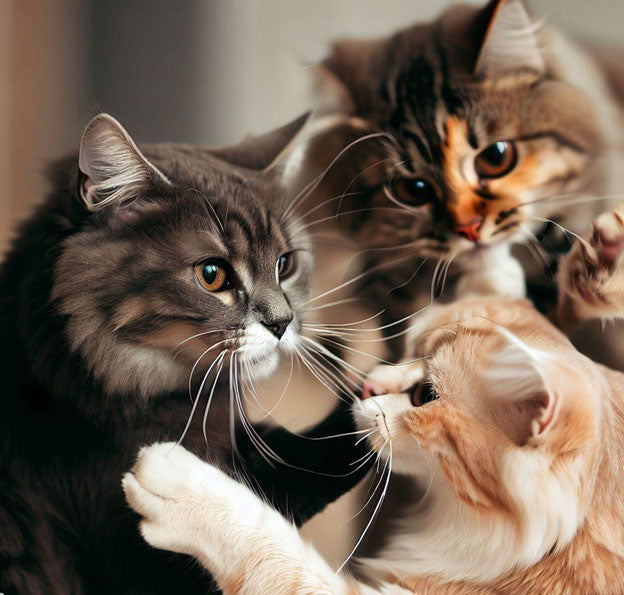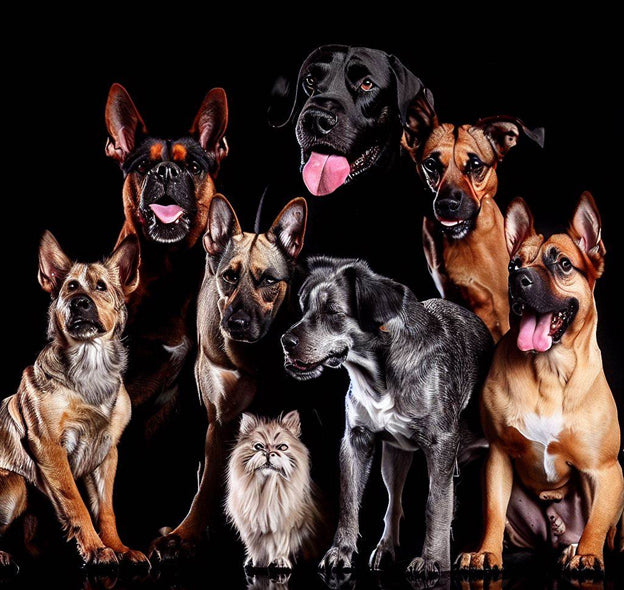
Why Is My Cat Breathing Fast?

If your cat is breathing rapidly, especially if it includes open-mouth breathing, you may be wondering why is my cat breathing fast? Rapid breathing in cats can signal distress or an underlying health issue. Stress or anxiety may cause a cat to breathe quickly with rapid rise and fall of the chest, as can overheating or overexertion during play. Respiratory infections, such as upper respiratory infections, can also lead to rapid breathing in response to congestion.
More concerning causes include heart disease, pulmonary edema (fluid in the lungs), airway obstructions from foreign objects, allergic reactions, asthma, pain, or toxin ingestion. When you notice the cat’s rapid breathing, you must monitor it closely, noting its breathing rate, chest movement, and gum color. If the rapid breathing persists for more than a few minutes or is accompanied by other concerning symptoms, such as lethargy or disorientation, seek immediate veterinary attention.
Cat Breathing Fast: The Underlying Causes
Fast breathing in cats, including open-mouth breathing, may resolve independently or require immediate attention. The causes of rapid breathing in cats can include stress, respiratory infection, anxiety, overheating, vigorous exercise, or excitement, which can lead to a temporary increase in breathing rate. More serious conditions like heart disease can result in persistent rapid breathing as the heart struggles to pump blood effectively, leading to a respiratory rate exceeding 30 breaths per minute.
In such cases of respiratory distress, counting the number of breaths per minute is essential. Seeking immediate veterinary care is crucial as it could indicate severe underlying issues, including pulmonary edema, airway obstructions, allergic reactions, asthma, pain, or toxin ingestion. Monitoring your cat's breathing closely and recognizing the symptoms is crucial.
-
Stress and Anxiety: Exposure to unfamiliar environments, car rides, or vet visits can cause rapid breathing due to fear or emotional distress. This is usually temporary and resolves after a few minutes.
-
Overheating: Cats pant and breathe rapidly when overheated due to a hot environment or overexertion.
-
Vigorous Exercise: Cats may breathe rapidly as they recover after playing or exercising intensely. This is usually temporary and subsides as they cool down.
-
Excitement: Cats can exhibit rapid breathing when excited or stimulated, often when eagerly anticipating something.
-
Respiratory Infections: Upper respiratory infections can cause symptoms such as nasal discharge, sneezing, and coughing, which may be accompanied by rapid breathing.
-
Heart Disease: Heart conditions like congestive heart failure can cause labored breathing when the heart struggles to pump blood effectively, leading to rapid respiration.
-
Pulmonary Edema: Pulmonary edema lungs filling with fluid accumulation in the lungs can cause difficulty breathing and is often a result of underlying heart disease or other issues.
-
Airway Obstructions: Foreign objects lodged in the windpipe or other airway obstructions can cause labored breathin and require urgent medical attention.
-
Allergic Reactions: Allergies to substances like insect stings or certain foods can cause rapid breathing, swelling, or hives.
-
Asthma: Feline asthma can cause wheezing, coughing, and rapid breathing.
-
Pain: Cats may breathe rapidly when in pain due to injuries, dental issues, or other health problems.
- Toxin Ingestion: Ingesting toxic substances can cause various symptoms, including rapid breathing. Immediate veterinary care is necessary for toxin exposure.
If you're unsure or if the rapid breathing persists or worsens, consult your veterinarian for a proper diagnosis and guidance on how to help your cat’s breathing.
Know More: Why Do Cats Rub Their Faces on Humans
How to Treat Rapid Breathing in Cats?
The treatment plan for rapid breathing in cats depends on the underlying cause. Following these steps is essential to ensure your cat's well-being.
Observe Cat's Breathing: Start by closely monitoring your cat's breathing. Count the number of breaths per minute to determine the breathing rate. The average respiratory rate for cats at rest is around 20-30 breaths per minute.
Assess for Resolution: If the rapid breathing resolves independently after a few minutes and your cat returns to normal, it might have been a temporary response to stress, excitement, or exercise. Ensure your cat remains calm and comfortable.
Check for Heart Murmur: If the rapid breathing persists or you notice other concerning symptoms, such as coughing, lethargy, or difficulty breathing, gently listen to your cat's chest for evidence of a heart murmur. If you suspect heart disease, consult your veterinarian.
Inspect Gum Color: Check the color of your cat’s gums. Healthy gums should be pink. Pale or bluish gums can indicate poor oxygenation, possibly associated with heart or respiratory issues.
Stress Reduction: If stress or anxiety is the suspected cause, provide a calm environment for your cat, offer hiding spots, and use pheromone diffusers to reduce anxiety.
Maintain a Healthy Lifestyle: Ensure your cat maintains a healthy weight, receives regular check-ups, and stays current on vaccinations to prevent respiratory infections.
Prevent Toxin Exposure: Keep potentially toxic substances out of your cat's reach, including plants, chemicals, and human foods harmful to cats.
If your cat is breathing rapidly or having respiratory distress that doesn't resolve after a few minutes, seek immediate veterinary care. Your vet will diagnose the issue and recommend treatment, including medications, oxygen, or surgery. Follow their instructions diligently and make necessary lifestyle changes or dietary adjustments. Rapid breathing can indicate serious health issues, so prompt veterinary care is essential for your cat's well-being.
Remember, if your cat is breathing fast, it may have an underlying health issue requiring immediate attention from a vet. Your love and concern for your feline baby are unlimited. Immortalize the loving bond with a personalized cat portrait. These customized gifts also make heartfelt presents for other cat lovers. Gift a fellow feline lover a custom pet gift. You could choose from a range of products like custom pet mugs, phone cases, blankets, and pillows.
Popular Blog
Dog Channels on YouTube That Woo!
Ever wondered where to find the most enchanting, heartwarming, and entertaini...
Dog Profiles on Twitter-Oh, You’ve Got To Tweet Them Back!
In the vast realm of social media dogs, some shine brighter than the rest—the...
Dog Influencers on TikTok Will That'll Melt Your Heart
Dog stars of TikTok are paw-sitively taking over our hearts, one adorable zoo...
Pet Profiles of Influencer Dogs on Facebook To Follow!
In social media, influencer pets have taken center stage, captivating audienc...











